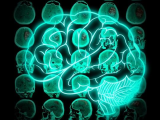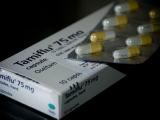Jan 12, 2011
Novel H1N1 flu found in British turkeys
A strain of H1N1influenza closely resembling the pandemic 2009 strain has been detected by routine surveillance in turkeys in the United Kingdom, according to its Department for Environment, Food and Rural Affairs (DEFRA). In a release today, DEFRA said, "The strain is closely similar to the human pandemic H1N1strain currently circulating." The agency said the "small number" of infected turkeys, from a farm in Cheshire, pose no public health risk. The birds exhibited only mild signs of the disease and showed clinical improvement. The release noted that pandemic 2009 H1N1 flu has been confirmed in poultry in other countries, including the United States, Canada, Chile, and France.
Jan 12 DEFRA notice
UK GPs warned of bacterial co-infections with flu
British general practitioners were warned in a letter from Sally Davies, interim chief medical officer of the UK Department of Health (DH), of an increase in "significant" bacterial co-infections with influenza, the journal Pulse reported today. The letter said that co-infection with meningococcal disease and flu can occur for up to 6 weeks after flu season peaks. In other flu news, officials who were the first in the United Kingdom to offer vaccine to healthy children have abruptly stopped the campaign on advice from regional officials and the government, according to a Manchester Evening News story today. Two schools with a large percentage of minority students in the town of Bury, north of Manchester, had been administering vaccine. Yesterday, however, officials from the DH and a regional primary care trust recommended that the vaccine be made available only to children in high-risk medical groups and not to healthy ones.
BMJ report says Wakefield tried to profit from vaccine-autism scare
In a second BMJ article on Dr Andrew Wakefield’s discredited work that had linked the measles, mumps, and rubella vaccine to autism, journalist Brian Deer reported that Wakefield and some of his colleagues hoped to profit from vaccine fears. Wakefield claimed that the vaccine could cause "autistic enterocolitis," and he proposed setting up a company to perform specialized molecular viral diagnostic tests and offer an alternative to the measles vaccine and a therapy based on "transfer factor." Deer reported that transfer factor is an abandoned fringe technology designed to move immune cells from person to person. A confidential business prospectus said the company's initial customer base would come from litigation-based testing of suspected autistic enterocolitis patients in the United States and United Kingdom. The scheme unraveled after a new head of medicine at London’s Royal Free medical school, where Wakefield worked, raised questions about conflict of interest, Deer reported. Wakefield has defended his research, and CNN reported today that in a radio interview yesterday, he described the BMJ articles as "utter nonsense."
Jan 11 BMJ report
Jan 12 CNN report



















